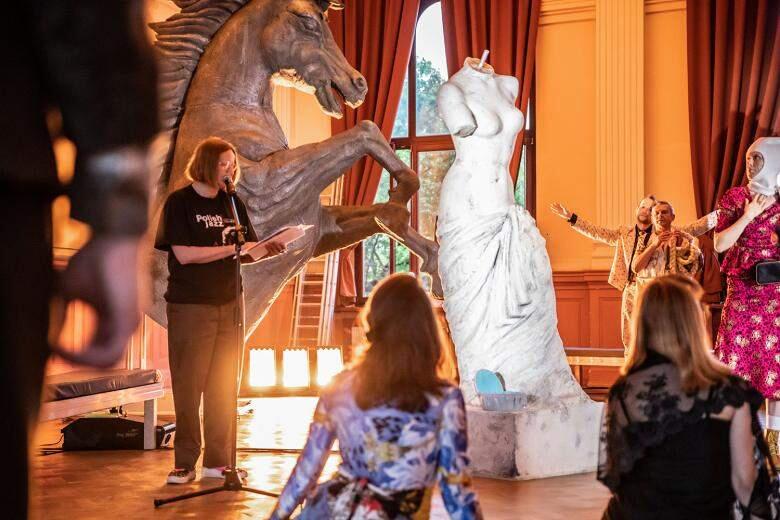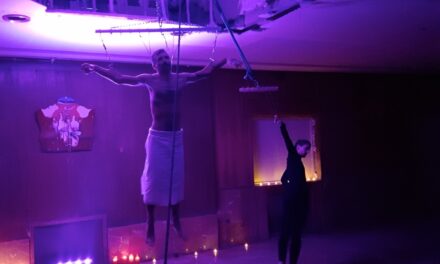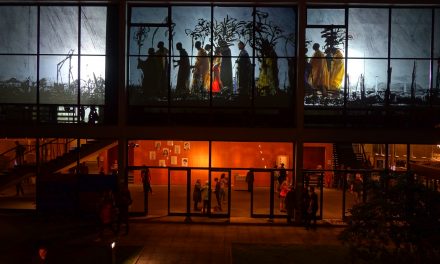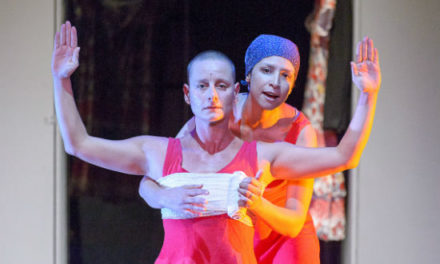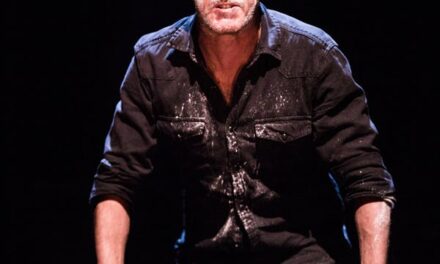Klaudia Hartung-Wójciak’s Ach, jeżeli przyjdę dać, tak okrutne, moje ostatnie pożegnanie (Ah, if I come to bid my last and cruel farewell) is an unusual show in several respects. Firstly, it is not staged in Teatr Polski in Bydgoszcz but in the auditorium of High School One in Bydgoszcz, a space framed by two huge windows. When it premiered in the early summer of 2021, the actors were bathed in natural light with little in the way of stage lighting (which would become more prominent as it gradually got darker outside). Secondly, it draws on Sophocles’ Antigone but incorporates only brief excerpts of the original text and is a discussion of Sophocles’ play rather than its revival. A tricky discussion at that.
I tended to read Antigone as a play about the sanctity of grief and mourning. To me, that sanctity used to be absolutely inviolable as a phenomenon that transports one into another realm where they are not to be touched, like an object of worship. A few of my own grievings later, I realized that this was not entirely true. Grief is not sublime and sacred ‒ it can be painfully ordinary: at times helpless, at other times embarrassing, always looking for ways to speak about things that are as difficult to speak of as they are to be silent about. We still find it hard to be honest when discussing grief and mourning, which is evidenced by how often we resort to banding about the dead’s names and to blackmailing others with the memory of the dead in Polish public disputes and, very likely, in private life as well. Having a roll-call of the dead at the ready for all occasions is a useful tactic.
Barbara Hanicka’s set has only two elements but both are pretty impressive: the life-size cast of the Venus de Milo and the monumental sculpture of a horse with its hooves slashing through the air and a unicorn horn. The stylish auditorium of High School One morphs into a solemn museum space but there is something jarring about it: the Venus de Milo is just a cheap copy of the original housed in the Louvre and the unicorn is halfway between a giant statue of Bucephalus and a tribute to the My Little Pony universe. This peculiar space of play rivets one’s attention right from the start and then becomes ever more unreal as it gets darker outside and the artificial lighting comes into play.
Classical art exists here to be worshipped in an institutionalized way as the museum space is visited by a group of tourists escorted by a Greek-speaking guide (the excellent Emilia Piech) whose lines are translated into Polish by (the equally excellent) Małgorzata Witkowska. The guide’s monologue is gobbledygook. Intended as a display of erudition, it mixes facts and threads, rambles and is unbearably infantile in tapping into simple clichés invented by institutions that sell snapshots of classical culture. It cares about nothing but major works, reducing works of art to trophies ticked off on the fly before rushing on to the next attraction. The monologue is about anything and everything, from classical art to the busts of famous composers sitting near the school building in the park by the Bydgoszcz Philharmonic Concert Hall.
The museum-cum-tourist attraction is not the only institution that is part of the unique discourse of Ah, if… The other is the school, so it is not an accident that the show is staged in a high school. In contrast to High School One, however, the establishment is not a top-notch one as it combines the worst features of Polish and foreign education by feeding students reductive slogans. When the subject of Thebes comes up, we hear: “Many books on the required reading list are set in Thebes.” In Michał Surówka’s excellent monologue on the definition of mourning (Surówka plays Haimon, among other characters), the words flow freely, segueing from the question of life and death to the words “life is a novella” (the title of the theme song of the Polish soap opera Clan) to the statement that the novella is a major literary genre.
Nobody shies away from simplification, utter conceptual chaos and hi-jinks that are nothing short of cringeworthy. Marian Jaskulski brings a braid on an ornamental cushion to the stage and tearfully recounts how the “antique wind” blew in the (equally antique) braids of Antigone, who was in love with Homer and Sophocles. Surówka ponders the question of cremation and asks the “big” question whether a cremated pope would become a cream pie (the cake famously associated with John Paul II). From time to time, Małgorzata Witkowska asks Emilia Piech to play “tragically and mournfully,” to which Piech responds by sitting at the harp and starting to play. The school and the museum could serve as tools for controlling the ongoing torrent of associations but they have the opposite effect, adding more simplifying formulas and chaos-inducing superficial links to an already shaky structure.
This perverse filter is applied not so much to Antigone as to its subject matter ‒ memory and mourning. The chaotic mixture of tropes and images (the huge sculptures, the smoke they are enveloped in, the actors’ poses) revolves around them. The actors mourn not only Antigone but also the mutilated figure of Venus de Milo, which at one point loses her head. A string of poignant and comic dog epitaphs are delivered. There are rapid tone shifts. Monologues full of pretentious, pompous seriousness, such as the guide’s harangues, give way to simple-minded naivety, as in Surówka monologue in which he tries to define mourning. The actors move from chaotic exchanges and loose impressions to beautiful choral singing. There is no orderly structure. The overall impression is that of great diversity.
In Antigone, remembrance and different forms of mourning are primarily a political issue. Political mourning is ardent, spectacular and, most importantly, effective as a tool for strengthening collective identity. It knows which topics to address and which to leave out. Antigone rejects this understanding of mourning, so she is punished. The mourning in Ah, if… is starkly different ‒ the mourners try to align with the official forms of commemoration but have no clue how to do it so the effect often comes off as awkward. At times their wild associations blend tropes from museum and school archives, at other times they are potentially subversive in a refreshing way (like the vision of the Pope transforming into a cream pie). The moments when mourning embraces subjects officially seen as unworthy of commemoration, such as the actors’ memories of their first encounter with Antigone or the recurring theme of grieving one’s dog, are genuinely poignant. The institutional forms of mourning reveal themselves to be a cracked façade but what emerges through the cracks is very interesting. Grief and mourning are no longer defined by their solemnity and dignity but by their jarring moments, the awkwardness and confusion that are comical or even touching. The greatest asset of the show is how it dismantles mourning, illuminating its faults.
All this is interesting enough to wish that Ah, if… would explore the problem of memory more deeply and fully, but the production is little more than a sequence of extended theater etudes. They are often brilliant, moving or amusing, but just as often they only scratch the surface of the subject. Not everyone will be bothered by that as the creators, from the start, make no secret that they want the show to be a sketch rather than a meticulously crafted whole. However, with its interesting, unabashed and subversive angle at memory and mourning, the play leaves the audience somewhat dissatisfied and hungry for more.
Teatr Polski im. Hieronima Konieczki, Bydgoszcz
Ach, jeżeli przyjdę dać, tak okrutne, moje ostatnie pożegnanie (Ah, if I come to bid my last and cruel farewell)
Inspired by Sophocles’ Antigone
Directed by Klaudia Hartung-Wójciak; dramaturgy by Iga Gańczarczyk; stage design by Barbara Hanicka; costumes by Hanka Podraza; music by Paweł Peszat; lighting design by Jędrzej Jęcikowski
Premiered on June 11th, 2021
About the author
Paweł Schreiber, PhD, is assistant professor at the Department of English-Language Literatures of the Kazimierz Wielki University in Bydgoszcz. His main field of research is contemporary British drama. Paweł is a researcher and critic of video games and a member of the program board of the Indie Games Poland Foundation.
The article was first published in Polish in Didaskalia, No. 166 in December 2021. It was translated by Didaskalia into English for TheTheatreTimes.com. To read the Polish text, click here. Didaskalia is now an open-access journal appearing bimonthly.
This post was written by the author in their personal capacity.The opinions expressed in this article are the author’s own and do not reflect the view of The Theatre Times, their staff or collaborators.
This post was written by Paweł Schreiber.
The views expressed here belong to the author and do not necessarily reflect our views and opinions.

